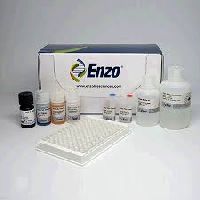
Field Marker
Prostate specific antigen (PSA) is a serin-like protease with molecular weight ca. 34 kDa and was initially found exclusively in normal prostatic gland as well as in prostatic fluid and seminal plasma. Later it was localized also in breast milk and, according to its enzymological properties, was classified as human prekallikrein 3. In human serum, most of PSA forms complexes with serine protease inhibitor proteins (mostly alpha-1-antichymothripsin, alpha-2-macroglobulin and antithripsin). A minor proportion of PSA (free PSA) is circulating outside these complexes. Elevated serum PSA levels are found in patients with prostatic adenocarcinoma even at early stages of the disease. Values of 1000 ngml and even more may be found in patients with profound disease. Clinical value of this parameter is due to possibility of clinical monitoring and prognosis of the disease. Continuous elevation of PSA level is indicative of tumour progression and ineffective therapy. Nevertheless, interpretation of the results obtained should be made in the context of other clinical data.the pair of monoclonal antibodies used in present test system (PS2-PS6), recognizes both free and complex-bound forms of PSA with equal affinity (equimolar binding). Elevations of serum PSA levels are characteristic to prostatic hyperplasia, inflammation and tumours. Serum PSA level can be used for monitoring and treatment control of all diseases involving prostatic tissue, especially prostatic tumours. Additional information valuable for differential diagnosis between benign and malignant prostate hyperplasia may be obtained by estimation of free PSAtotal PSA ratio.
...moreBe first to Rate
Rate This